November 26, 2025 | 14:23 GMT +7
November 26, 2025 | 14:23 GMT +7
Hotline: 0913.378.918
November 26, 2025 | 14:23 GMT +7
Hotline: 0913.378.918
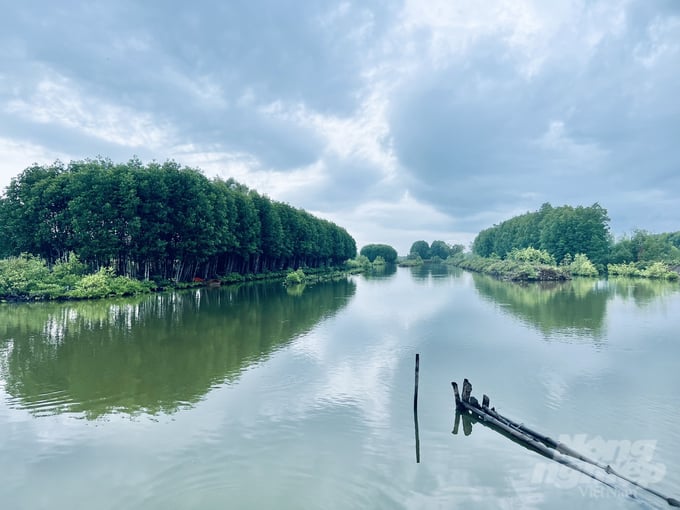
The model of wild shrimp in Ngoc Hien district (Ca Mau) has achieved many international certifications such as Naturland, EU Organic, Selva Shrimp, Mangrove Shrimp, Canada Organic, ASC, BAP... Photo: Trong Linh.
Established in 2017, Minh Phu Forest Shrimp Chain Social Joint Stock Company has always set production goals for society and the environment.
Green mangrove forests are located in the mangrove forest in Ngoc Hien district, about 60km from Ca Mau city, around the company's production area. Along the two sides of the road, people circled into long, straight beds to raise wild shrimp.
Starting to implement organic and ecological shrimp farming projects in 2013, the company's founders have rapidly increased the area of forest shrimp farming. Mr. Duong Vu Phong, head of the project board of forest shrimp farming in Ngoc Hien district, said that up to now, the ecological shrimp farming area had been certified for ecology, reaching 11,400ha, with more than 2,300 farming households in 3 communes, including Vien An and An Dong and Dat Mui communes.
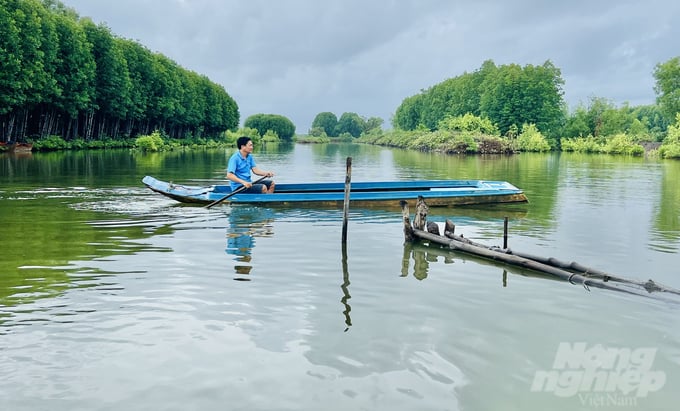
Mr. Pham Ngoc San, Secretary of Bien Nhan Hamlet, An Vien Dong commune, rowed a canoe to visit the family's shrimp. Photo: Trong Linh.
"Realizing many benefits when participating in the forest shrimp chain of Minh Phu company, many people have contacted to join the association for sustainable development," said Mr. Phong.
Compared to before, the shrimp farmers in Ngoc Hien now know how to brand and organize production to meet market standards. Especially when participating in the model, farmers are supported with the procedures to issue the code of the farming area. Currently, households here are trying to meet the international standards of Naturland.
To get this certificate, shrimp farmers must prove they do not affect the mangroves. In addition, the forest cover rate reaches 40% or more of the pond area, and no harmful chemicals are used.
Also, shrimp farmers must participate in managing and protecting mangroves and wild animals listed in the Redbook. They also need to ensure standards on seed, waste management, environmental sanitation, etc., and commit not to cut down trees or change the status of forest land.
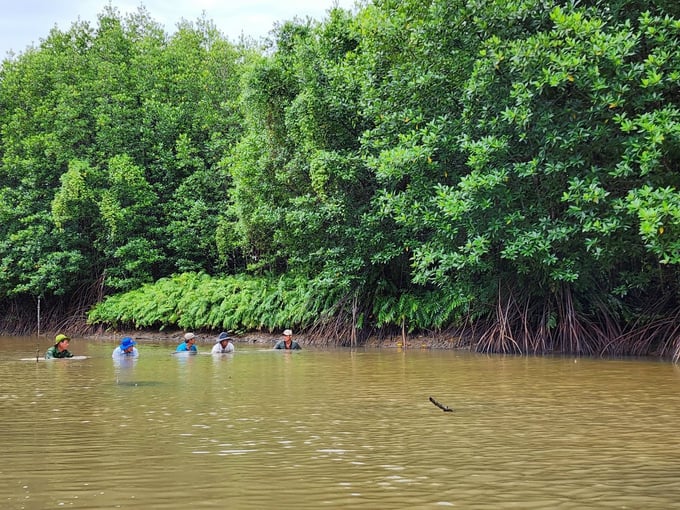
The mangrove forest ecosystem in Ngoc Hien (Ca Mau) is increasingly proliferating and rich, creating very favorable conditions for ecological shrimp farming. Photo: Trong Linh.
Farming-related activities such as improvement, destruction of trash fish, stocking, harvesting, etc., must be fully recorded in the diary. Technical records and documents must be kept for at least five years.
When wild animals appear in the farm area, people must protect them, report them to the management agency, and not hunt or trade them in any form.
If certified organic shrimp farming is done, people will enjoy many benefits. Firstly, the product is sold higher than the regular price (about VND 3,000/kg). Second, receive the support of 20,000 breeds/year. Third, there is an additional fee for forest environmental services, about VND 500,000/ha (by 2022).
Profits from production will be deducted 60% by Minh Phu Forest Shrimp Chain Social Joint Stock Company to reinvest in the model.
"The project contributes to raising environmental protection awareness, developing mangrove forests, preserving traditional forest shrimp farming, and turning wild shrimp into high-quality products," said Mr. Duong Vu Phong.
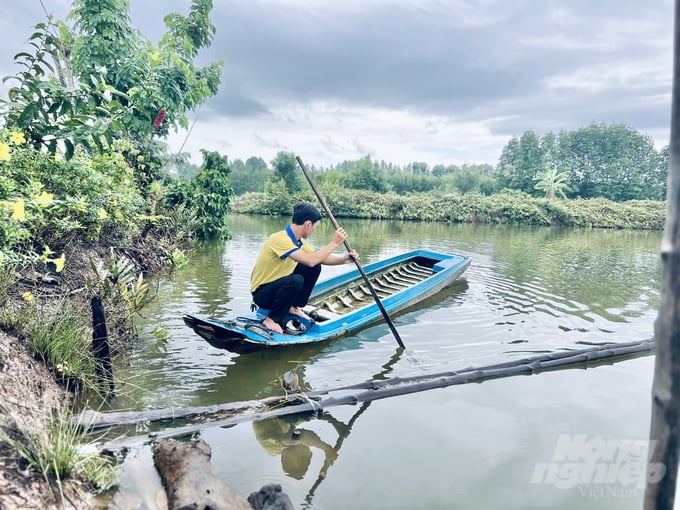
An officer of Minh Phu Forest Shrimp Chain Social Joint Stock Company inspects the ponds of households. Photo: Trong Linh.
Mr. Le Van Khoa, 54 years old, residing in Bien Nhan hamlet, Vien An Dong commune, Ngoc Hien district, said his family has more than 3 hectares of wild ecological shrimp farming. In the past, ponds were cultured traditionally. After a few years, they often showed signs of pollution, causing a decrease in productivity. In some cases, his family lost everything.
Since switching to organic shrimp farming, the family's profit has increased by 10-20% compared to before. Not only escaping the precarious situation, but Khoa's family members also felt an apparent change in life.
According to Mr. Khoa, ecologically farming wild shrimp does not require machines. His family members still have time to do other jobs and improve the family's income, but maintain a stable income of about VND 150-200 million/year from ecological shrimp farming.
"I feel very comfortable raising wild shrimp. Almost no one in the house still has to do heavy work," said Mr. Khoa.
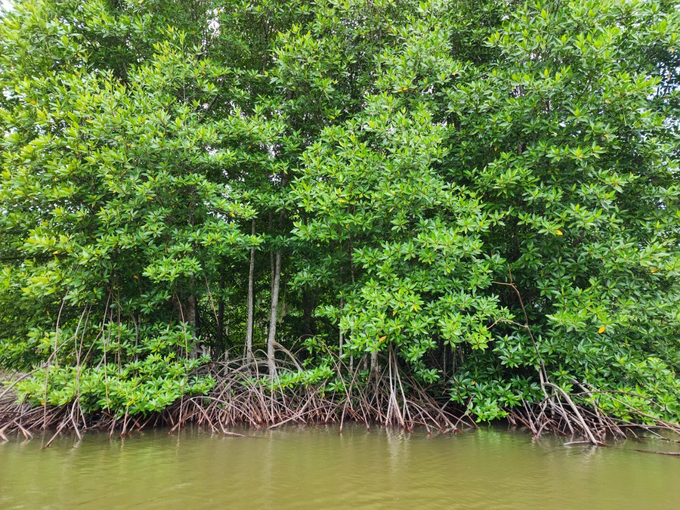
The success of forest shrimp farming has shown that environmental protection can bring sustainable economic value. Photo: Trong Linh.
Mr. Khoa's family is one of 136 households in Bien Nhan hamlet implementing organic shrimp farming. Nearly 10,000 hectares of farming households enjoy the fresh air and are no longer haunted by wastewater.
This is because large shrimp are entirely natural in the mangrove environment. Thanks to the water surface keeping the cover, the ponds no longer have to implement measures to combat drought, salinity, and waterlogging like intensive shrimp farming.
Mr. Tran Hoang Lac, Chairman of Ngoc Hien District People's Committee, each year, the locality produces more than 4,000 tons of organic shrimp with international certifications such as Naturland, EU Organic, Selva Shrimp, Mangrove Shrimp, Canada Organic, ASC, BAP. The district provides up to 38,000 tons of shrimp and crabs of all kinds annually.
In addition to Minh Phu company, Ngoc Hien district also cooperates to deploy forest shrimp farming with two other companies, Camimex Ca Mau Seafood Import-Export Company, and Seaprimexco Nam Can Seafood Import-Export Company. All are in a closed chain.
People confidently say that Ngoc Hien organic shrimp has conquered fastidious markets such as the US, Japan, and the EU from the mangrove forests in Ca Mau.
Translated by Ha Phuc
/2025/11/26/3627-4-082628_818.jpg)
(VAN) From a small café on the red basalt highlands, Le Van Hoang started a business with clean coffee, building Enjoi Coffee into a symbol of organic agriculture in the Lam Dong plateau.
/2025/11/25/0045-1-135246_13.jpg)
(VAN) Ca Mau is researching a model of sea-encroaching embankments combined with viaducts and logistics service zones, aiming both to prevent erosion and create land funds for marine economic development.

(VAN) The information was shared at the seminar 'Urban Agriculture - Solutions for Developing Green Spaces,' organized by the Kinh te & Do thi Newspaper and the Biotechnology Center of Ho Chi Minh City.
/2025/11/19/4141-2-132831_216.jpg)
(VAN) One of Japfa's outstanding solutions is implementing digital transformation and artificial intelligence (AI) to optimize operations, enhance productivity, and advance sustainable development.
/2025/11/19/4847-1-093540_448.jpg)
(VAN) The Gia Lai Provincial People’s Committee had a working session with the delegation of the U.S. Department of Agriculture, the State of Idaho, and representatives of the State's leading enterprises.

(VAN) Ca Mau has a sufficient foundation to become a strong regional aquaculture center, where production integrates the economy, the environment, and the lives of the people.

(VAN) SEIKI Group envisions itself as a pioneer in the ‘dual transformation’ of digital technology and green industry, standing alongside the Government and Vietnamese businesses in their pursuit of sustainable development.